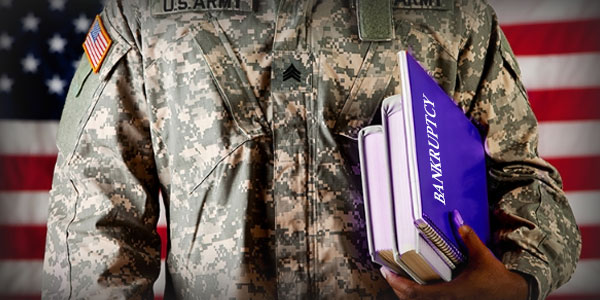If you are a military personnel and serving the nation, you have the same rights as any other civilian to file for bankruptcy and urge for protection from intimidating creditors. There are no legal restrictions as of now to prevent you from filing personal bankruptcy and requesting protection under either the Chapter 7 or Chapter 13 provision.
Is bankruptcy a good option for military people?
Though the military personnel maintain a prudent lifestyle while far away from home, it’s not that they are immune to financial hardships or accidents. Just like us, they too have homes and families and can definitely accrue debt in regular situations.
In order to protect national interests, the military follows protocols that involve checking the financial status of the individuals. Military personnel accessing classified information are required to go through extensive background checks and top-tier security clearances. Unfortunately, this means that bankruptcy on your credit history can have a negative impact on your ability to hold and serve these positions. Following are few questions that you might encounter during top-tier security clearances:
- Did you ever had an account delinquent beyond 180 days?
- Have you ever been subject to wage garnishment?
- Have you ever had a judgment against you?
The Service Member’s Civil Relief Act
If you are an active military personnel and seriously considering bankruptcy, you should sit with an experienced bankruptcy lawyer and understand both the boons and pitfalls of filing bankruptcy. In recent years, a few laws have been enacted that give special rights to military personnel who are suffering with their finances. This law, named as Service Member’s Civil Relief Act, offer special protections during filing bankruptcy. Indeed, it helps busy military personnel to do their duties towards the nation without being driven away by any financial anxiety.
This act either prevents or delays:
- Default judgments initiated by debt collectors
- Bank attachments
- Foreclosure proceedings
- Eviction proceedings
- Wage garnishment
What are the special protections that Service Member’s Civil Relief Act offer?
Not required to pass Chapter 7 means test:
Common civilians need to go through a means test during the Chapter 7 bankruptcy procedure. However, individuals who serve in the National Guard or are disabled veterans, are exempt from this test. Nevertheless, there are several limitations on this exemption. Check those with your lawyer.
Exemption for disabled military veterans:
Nowadays, disabled veterans are given special privileges during bankruptcy filing if the disability occurred during the service. Particularly, exemption is offered only if the debt is accrued during:
- Active duty
- Defending the homeland
How military veterans are protected as per the HAVEN Act?
As per the HAVEN (Honoring American Veterans in Extreme Need) Act signed on Aug 23, 2019, if you are a military veteran and file bankruptcy, then your specified federal disability payments will not be included while calculating your income. Such benefits include the following:
- Disability and death benefits paid by the Veterans Administration;
- Special compensation for catastrophic injuries or illnesses;
- Special compensation for combat-related injuries from the Department of Defense;
- Disability severance pay from the DoD;
- Retirement pay related to a disability; and
- Survivors’ benefits paid to the family of a deceased veteran.
However, it will also affect which bankruptcy you can qualify for. The bankruptcy filers need to calculate their CMI (Current Monthly Income) to decide whether or not you qualify for it through the means test (in case of Chapter 7) or how much payment you can afford (in case of Chapter13). While doing this, as a military veteran, you can exclude your disability benefits from your CMI.
Exemption for National Guard personnel:
Active members of the National Guard are also given some sort of privileges while filing Chapter 7 bankruptcy. However, there are some clauses and those follow:
- The personnel should be involved in defending the homeland for at least 90 consecutive days
- The personnel should successfully file for bankruptcy within a period of 18 months after released from duties
Credit counseling:
In order to successfully file for bankruptcy, the regular debtors are required to opt for a credit counseling course. However, the active duty personnel are not required to enrol in any credit counseling course during bankruptcy procedures.
Veterans, who receive many benefits due to their years of service to the nation, are also granted some protections during bankruptcy. While in many states the benefits are automatically imparted, there are some states that actually try to seize veterans’ benefits. However, a veteran has the rights to take action in some cases where his/her benefits are being confiscated.
In our society, the military personnel are regarded with a high degree of estimation. If a military personnel is experiencing financial hardships, he/she should file for bankruptcy if it’s unavoidable. All the benefits being said above, we can conclude with that bankruptcy is a viable option for those individuals who are serving in the military.









